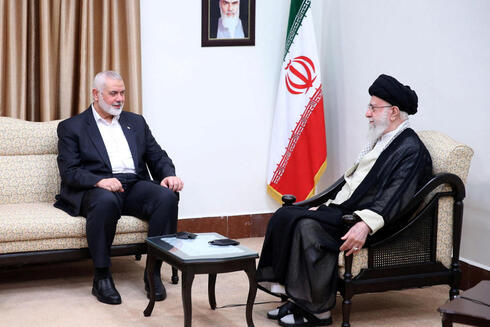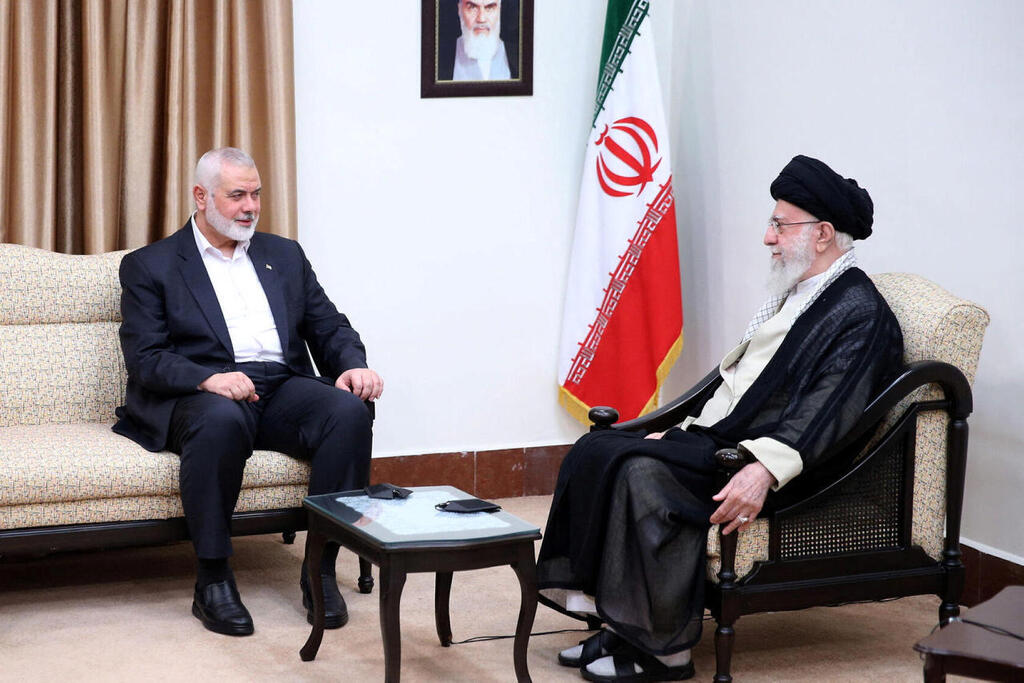
Double assassinations pose new dilemma for Hezbollah and Iran
The assassination of Ismail Haniyeh in the heart of Tehran proved the intelligence penetration of the Ayatollah regime. However, it is the assassination of senior Hezbollah commander Fuad Shukr that threatens to bring about regional escalation. In Lebanon, there is concern that Hezbollah’s attempt to target high-value targets in Israel will lead the country "back to the Stone Age"
In one night, the so-called "Axis of Resistance" suffered severe blows in the double assassination of two senior figures. The more well-known Ismail Haniyeh, the head of Hamas' political bureau, was assassinated in Tehran, proving yet again how deeply Iranian intelligence has been penetrated. However, it was the assassination of the lesser-known Fuad Shukr, the senior Hezbollah commander, in Beirut’s Dahiya district which may cause a regional escalation.
Haniyeh, 62, was a member of a Palestinian refugee family from Al-Shati in Gaza. Once a junior member of Hamas, his star rose starting in 1997 when he became the personal assistant to Sheikh Ahmed Yassin, the founder and spiritual leader of Hamas. His proximity to Yassin helped him bypass more senior figures in the organization to head Hamas's list for the general elections held by the Palestinian Authority in 2006, despite Yassin being assassinated two years earlier. Hamas's sweeping victory in the elections paved the way for him to become the Palestinian Prime Minister, a position from which he was dismissed in 2007 after Hamas's bloody takeover of Gaza, effectively ending the unity government with Fatah.
Haniyeh has since served as the leader of Hamas in Gaza, but the release of Yahya Sinwar in 2011 as part of the Gilad Shalit deal undermined his position. According to reports, relations between Haniyeh and Sinwar were poor, partly due to their different approaches and backgrounds. Sinwar grew up in Hamas's military wing and advocated uncompromising “armed struggle” against Israel, while Haniyeh, whose path was different, believed in international diplomacy which made him less popular among Hamas’ military wing.
In 2017, Haniyeh was elected for the first time as the head of Hamas's political bureau, replacing Khaled Mashal, paving the way for him to leave Gaza and settle in Turkey and ultimately Qatar. From there, Haniyeh promoted the idea that military struggle against Israel should be accompanied by a "diplomatic struggle," which he managed mainly from his base in the Gulf, as well as during his visits to Tehran, Beirut, and other countries close to the "Axis of Resistance." Due to concerns over intelligence leaks and strained relations with Sinwar, Haniyeh was not privy to the plans for October 7 formulated by the military wing in Gaza, though he, like other external Hamas leaders, publicly supported the deadly attack.
Haniyeh was the face of Hamas on the international stage and, in his role, reportedly served as the go-between for Hamas in Gaza and countries mediating the efforts to reach a ceasefire agreement and release Israeli hostages. According to unofficial reports, differences arose between Haniyeh and Sinwar over the terms of the ceasefire, with Haniyeh trying to secure Hamas's future following the war on the Palestinian and Arab stage, while Sinwar and the military wing were seeking to ensure their own survival in order to declare a "divine victory." In the near future, Hamas's Shura Council, the organization's supreme body, will have to appoint a temporary successor to Haniyeh until internal elections are held for the position.
Alongside his role as the head of the political bureau, Haniyeh built a financial empire for himself and his family, often eliciting sharp criticism from his opponents both within and outside of Hamas, who accused him of amassing wealth at the expense of Gazans. According to previously published reports, Haniyeh's personal wealth was estimated at $4 billion, although this figure has never been proven. As part of his role he was highly involved in fundraising for Hamas, and the separation between organizational funds and his personal and family wealth was not always clear.
Despite his background, becoming a prominent Hamas leader in Gaza made it easier for Haniyeh and his family to become tycoons. Most of their business activities focused on real estate - Haniyeh owned apartments, villas, and residential towers across Gaza, including in the most sought-after areas. Some of the properties belonging to Haniyeh himself were registered under the names of associates and family members of his sister. It is also reported that the Haniyeh family had properties in Hamad City, a residential project in Gaza funded by the Qatari government.
Additionally, the Haniyeh family held a monopoly in Gaza’s generator market, exploiting the electricity shortage faced by Gazans. Sources in Gaza claimed that some of the residential towers owned by the Haniyeh family were previously used by Hamas's military wing for training and operational activities.
Haniyeh's departure from the scene could harm funding for Hamas, but since he didn’t manage his economic empire and Hamas's financial networks alone, it is likely that his shoes will be filled shortly in this area.
On the path to economic crisis in Lebanon
The assassination of Fuad Shukr, a senior Hezbollah commander, in the organization’s stronghold in southern Beirut on Tuesday evening is the most painful blow to Hassan Nasrallah and his organization since the current war began on October 7. So far, Israel has eliminated about 400 Hezbollah operatives, some of them senior field commanders, but Shukr is on a different level. He is part of Nasrallah’s close inner circle and a member of Hezbollah’s Jihad Council, which directs the group’s military operations.
Shukr is not just another Hezbollah member; he joined the organization about 40 years ago and was long wanted by the United States for his role in the 1983 Beirut barracks bombing which killed 241 U.S. marines. Hezbollah cannot ignore such an assassination, but it faces a difficult dilemma; if it decides to expand its range of attacks on Israeli territory or strike high-value targets, such as infrastructure in Israel, it risks bringing destruction upon Lebanon. Political forces in Lebanon are exerting heavy pressure on Hezbollah to respond in a measured manner to the assassination to avoid destroying what little remains of Lebanon’s infrastructure and economy.
On Tuesday, even before Shukr's assassination, Lebanese Economy Minister Amin Salam said that most economic sectors in Lebanon are experiencing a decline in activity this year compared to last year, which itself was not marked by vigorous activity. Without mentioning Hezbollah, Salam warned that if “the conflict expands, Lebanon will return to the Stone Age.”
Lebanon is already in its fifth year of a severe economic crisis, during which the currency has collapsed, the electricity sector has crumbled, and investors from the Gulf are avoiding injecting their money into the Lebanese economy for fear it will go to waste. In this reality, Nasrallah must now try to craft an appropriate response to the Israeli assassination without dragging all of Lebanon into complete disaster.














